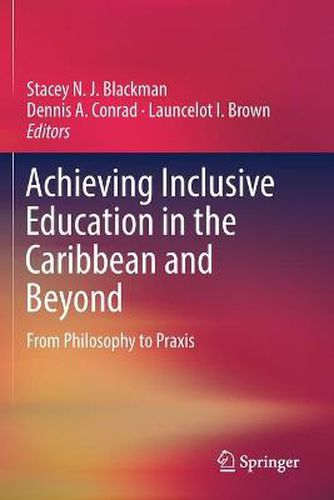Readings Newsletter
Become a Readings Member to make your shopping experience even easier.
Sign in or sign up for free!
You’re not far away from qualifying for FREE standard shipping within Australia
You’ve qualified for FREE standard shipping within Australia
The cart is loading…






This title is printed to order. This book may have been self-published. If so, we cannot guarantee the quality of the content. In the main most books will have gone through the editing process however some may not. We therefore suggest that you be aware of this before ordering this book. If in doubt check either the author or publisher’s details as we are unable to accept any returns unless they are faulty. Please contact us if you have any questions.
This book offers an international perspective of philosophical, conceptual and praxis-oriented issues that impinge on achieving education for all students. It sheds light on the historical, systemic, structural, organizational, and attitudinal barriers that continue to be antithetical to the philosophy and practice of inclusive education within the Caribbean. The first section of the book examines how globalized views of inclusion informed by philosophical ideas from the North have influenced and continue to influence the equity in education agenda in the region. The second section considers how exclusion and marginalization still occur across selected Caribbean islands. It provides both quantitative and qualitative data about the nature and experience of exclusion in selected Caribbean islands, the UK and USA. The third section tackles the practical realities of transforming education systems in the Caribbean for inclusion. In particular, it identifies teacher practices as the main site of interrogation that needs to be tackled if inclusion is to be successful. The fourth and final section examines the contribution of principals and exemplars to the development and advocacy for inclusive education. It discusses how educational leadership is understood, as well as the role of school principals in making inclusion a reality in schools, the challenges experienced and the qualities of education leaders.
$9.00 standard shipping within Australia
FREE standard shipping within Australia for orders over $100.00
Express & International shipping calculated at checkout
This title is printed to order. This book may have been self-published. If so, we cannot guarantee the quality of the content. In the main most books will have gone through the editing process however some may not. We therefore suggest that you be aware of this before ordering this book. If in doubt check either the author or publisher’s details as we are unable to accept any returns unless they are faulty. Please contact us if you have any questions.
This book offers an international perspective of philosophical, conceptual and praxis-oriented issues that impinge on achieving education for all students. It sheds light on the historical, systemic, structural, organizational, and attitudinal barriers that continue to be antithetical to the philosophy and practice of inclusive education within the Caribbean. The first section of the book examines how globalized views of inclusion informed by philosophical ideas from the North have influenced and continue to influence the equity in education agenda in the region. The second section considers how exclusion and marginalization still occur across selected Caribbean islands. It provides both quantitative and qualitative data about the nature and experience of exclusion in selected Caribbean islands, the UK and USA. The third section tackles the practical realities of transforming education systems in the Caribbean for inclusion. In particular, it identifies teacher practices as the main site of interrogation that needs to be tackled if inclusion is to be successful. The fourth and final section examines the contribution of principals and exemplars to the development and advocacy for inclusive education. It discusses how educational leadership is understood, as well as the role of school principals in making inclusion a reality in schools, the challenges experienced and the qualities of education leaders.